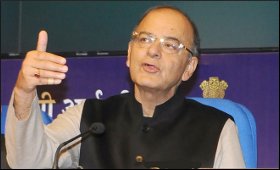|

|
Charges on digital transactions will come down: Jaitley
|
|

|
|
| Top Stories |
 |
|
|
|
SME Times News Bureau | 08 Feb, 2017
With a view to promote digital transactions, the Reserve Bank of India
(RBI) is working to reduce the Marginal Discount Charges (MDR) for debit
card transactions above Rs 2,000, Parliament was told on Tuesday.
"The
RBI is deciding on this... it is work in progress. I am sure as volumes
(of digital transactions) are increasing, the charges will come down,"
the Finance Minister Arun Jaitley told the Rajya Sabha during the
Question Hour.
Jaitley said that under the Payments and
Settlements Act, the RBI has recently fixed the MDR rate at 0.25 per
cent for cash transactions upto Rs 1,000, while for transactions upto Rs
2,000 it has been fixed at 0.50 per cent.
These charges have been introduced for the period from January 1, 2017, and will be applicable till March 31, 2017.
As per the RBI's rate structure announced in 2012, the MDR for transactions valued above Rs 2,000 has been capped 1 per cent.
In
response to another question, Jaitley described how the crucial
decision on demonetisation of Rs 1,000 and Rs 500 notes was taken by the
Reserve Bank of India (RBI) board at a day's notice.
He said
while the formal decision on demonetisation was taken by the RBI on
November 8, this had been preceded by a series of discussions started in
February 2016.
Last month, RBI Governor Urjit Patel told a
Parliamentary Committee that the apex bank had been "advised" by the
government on November 7 to hold a board meeting on the issue.
The
demonetisation decision was announced by Prime Minister Narendra Modi
on November 8 following a meeting of the RBI board and also of the Union
Cabinet.
To a separate question on whether it was the RBI that
took the decision on its own or whether the government advised it to do
so, Jaitley replied: "The RBI board met and independently applied its
mind and made a recommendation to the government."
"A formal
proposal to the RBI to consider this matter in the Board is sent by the
Finance Ministry to the RBI Board and RBI independently considers it,
applies its mind and accordingly makes its recommendation to the
government."
|
|
|
| |
|
|
|
|
|
|
|
|
|
|
|
|
|
|
| |
| Customs Exchange Rates |
| Currency |
Import |
Export |
US Dollar
|
66.20
|
64.50 |
UK Pound
|
87.50
|
84.65 |
Euro
|
78.25
|
75.65 |
| Japanese
Yen |
58.85 |
56.85 |
| As on 13 Aug, 2022 |
|
|
| Daily Poll |
 |
 |
| PM Modi's recent US visit to redefine India-US bilateral relations |
|
|
|
|
|
| Commented Stories |
 |
|
|
|
|
|
| |
|